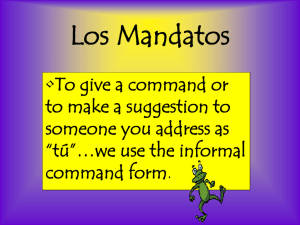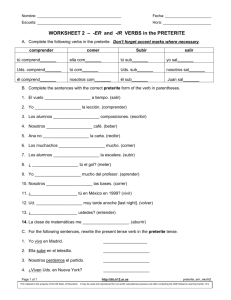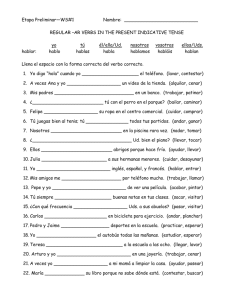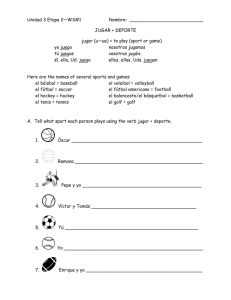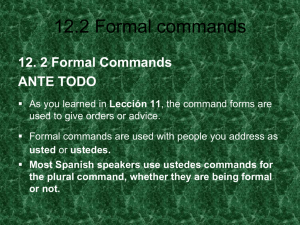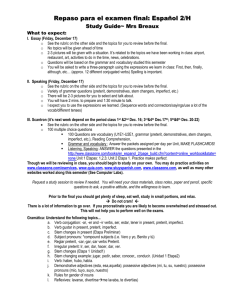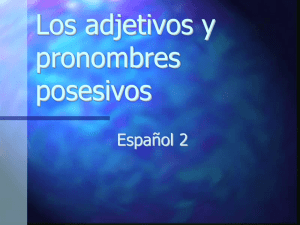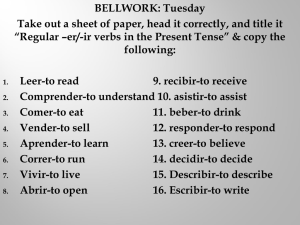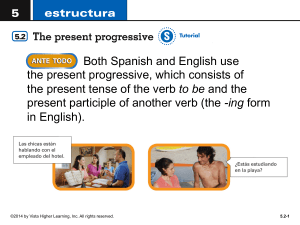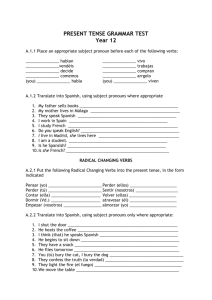Untitled 2
advertisement
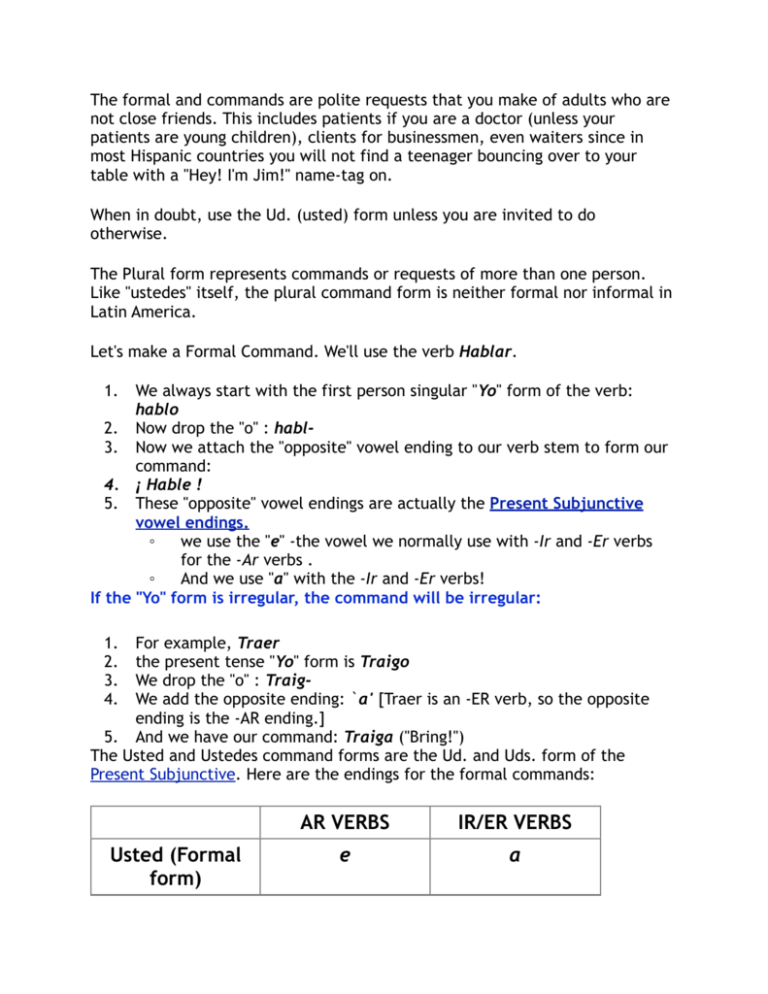
The formal and commands are polite requests that you make of adults who are not close friends. This includes patients if you are a doctor (unless your patients are young children), clients for businessmen, even waiters since in most Hispanic countries you will not find a teenager bouncing over to your table with a "Hey! I'm Jim!" name-tag on. When in doubt, use the Ud. (usted) form unless you are invited to do otherwise. The Plural form represents commands or requests of more than one person. Like "ustedes" itself, the plural command form is neither formal nor informal in Latin America. Let's make a Formal Command. We'll use the verb Hablar. 1. We always start with the first person singular "Yo" form of the verb: hablo 2. Now drop the "o" : habl3. Now we attach the "opposite" vowel ending to our verb stem to form our command: 4. ¡ Hable ! 5. These "opposite" vowel endings are actually the Present Subjunctive vowel endings. ◦ we use the "e" -the vowel we normally use with -Ir and -Er verbs for the -Ar verbs . ◦ And we use "a" with the -Ir and -Er verbs! If the "Yo" form is irregular, the command will be irregular: 1. 2. 3. 4. For example, Traer the present tense "Yo" form is Traigo We drop the "o" : TraigWe add the opposite ending: `a' [Traer is an -ER verb, so the opposite ending is the -AR ending.] 5. And we have our command: Traiga ("Bring!") The Usted and Ustedes command forms are the Ud. and Uds. form of the Present Subjunctive. Here are the endings for the formal commands: Usted (Formal form) AR VERBS IR/ER VERBS e a Ustedes (Plural form) en an If the Yo form is irregular in the Present Tense, it will be irregular in the Formal & Plural command form. Infinitive Yo form Ud. Command Form Salir Salgo Salga Hacer Hago Haga Poner Pongo Ponga Decir Digo Diga Venir Vengo Venga With verbs that end in "Y" in the Yo form as well as Saber are very irregular: Infinitive Yo form Ud. Command Form Estar Estoy Esté Dar Doy Dé Ser Soy Sea Ir Voy Vaya Saber Sé Sepa If there is a stem change in the Present Tense, there will be a stem change in the Command (Present Subjunctive) form: Infinitive Yo form Ud. Command Form Pedir Pido Pida Pensar Pienso Piense Dormir Duermo Duerma Atender Atiendo Atienda Hervir Hiervo Hierva Entender Entiendo Entienda Poder Puedo Pueda Freír Frío Fría 1. ¡ (decir) _________________________ Ud.! 2. ¡ no (venir) ______________________ Uds.! 3. ¡ (empezar) ______________________ Ud.! 4. ¡ no (perder) ______________________ Ud.! 5. ¡ (practicar) ______________________ Ud.! 6. ¡ no (jugar) ______________________ Uds.! 7. ¡ (repetir) ______________________ Ud.! 8. ¡ (hacer) ______________________ Uds.! 9. ¡ no (pedir)______________________ Ud.! 10. ¡ (ir) ______________________ Uds.! 11. ¡ (pagar) ______________________ Ud.! 12. ¡ (traer) ______________________Uds.! 13. ¡ (volver)______________________ Ud.! 14. ¡ (traducir)______________________ Ud.! 15. ¡ (seguir)______________________ Uds.! 16. ¡ no (estar)______________________ Ud.! 17. ¡ (buscar) ______________________Uds.! 18. ¡ no (salir)______________________ Ud.! 19. ¡ (llegar) ______________________Uds.! 20. ¡ (pensar)______________________ Uds.! 21. ¡ (conseguir) ______________________ Ud.! 22. ¡ (recordar) ______________________Ud.! 23. ¡ (conducir)______________________ Ud.! 24. ¡ no (dar) ______________________Uds.! Mandatos afirmativos 1.Luis y Javier ¡(bañarse) ______________________con jabón! 2. Niños, ¡(peinarse)______________________ Uds. antes de salir! 3. Amigos, ¡(lavarse) ______________________Uds. el pelo con champú! 4. Chicos, ¡(secarse) ______________________Uds. con una toalla limpia! 5. Niñas ¡(vestirse)______________________ Uds. rápido!. 6. Muchachos, ¡(divertirse) ______________________ Uds. en la escuela! 7. Ana y Carmen, ¡(quedarse)______________________ Uds. en sus cuartos!. 8. Jóvenes, ¡(acostarse)______________________ temprano! Mandatos negativos 9. Chicas, ¡no (olvidarse) ______________________Uds. del horario! 10. Muchachas, ¡no (cortarse) ______________________ Uds. el dedo! 11. Jóvenes, ¡no (enojarse)______________________ Uds. con sus amigos! 12. Alicia y Susana, ¡no (ponerse) ______________________Uds. ropa sucia! 13. Hermanos, ¡no (sentirse)______________________ Uds. tristes! 14. Amigas, ¡no (cansarse)______________________ Uds. demasiado! 15. Marta y Juan, ¡no (irse)______________________ Uds. sin permiso! 16.Hijos, ¡no (quedarse) ______________________ Uds. afuera por la noche!
